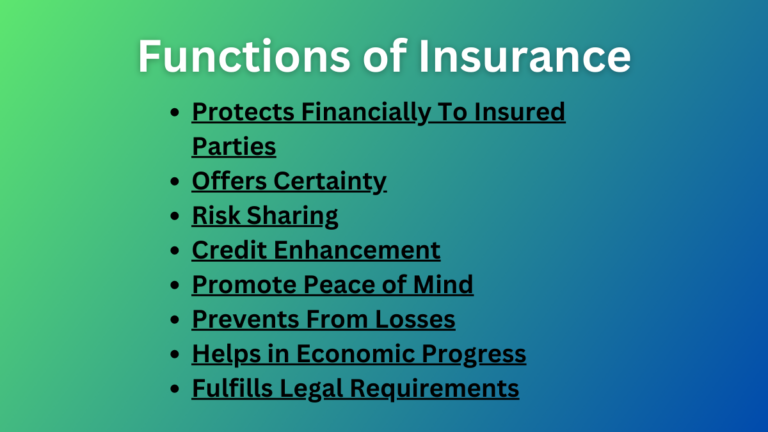What is Insurance? Definition, Essentials, Types, Principles, and Benefits
What is Insurance?
Insurance is a legal agreement between two parties an insurer (insurance company) and the insured (an individual) in which the insured parties receive financial compensation for any unexpected losses and events.
In the insurance agreement, insured parties are agreed to pay some money periodically which is called an insurance premium in exchange for mitigating financial losses.
The two concepts of insurance are:
- Functional Concept – It is an old concept of insurance in which a group of people contributes a small amount to a fund by which a member who faces unexpected financial loss gets compensated. It is based on the theory of cooperation for mutual help.
- Contractual Concept – Under this concept, insurance is a contract between an insurer and the insured where the insurer takes the responsibility of compensation of financial loss on the occurrence of unexpected events to the insured or his nominee.
Essentials of Insurance Contract
The followings are the main essentials for an insurance contract.
Offer and Acceptance
The policyholder or insured party must make an offer by completing an application, and the insurer must accept the offer by issuing a policy.
Consideration
Both parties must provide something of value. The policyholder pays premiums, while the insurer agrees to provide coverage.
Legal Purpose
The contract must be for a legal purpose and not against public policy.
Legal Capacity
Both parties must have the legal capacity to enter into the contract. The policyholder must be of legal age and mentally competent, while the insurer must be authorized to sell insurance in the jurisdiction where the policy is issued.
Utmost Good Faith
Both parties must deal with each other honestly and fairly. The policyholder must disclose all relevant information, and the insurer must provide accurate information about the policy’s terms and conditions.
Conditions and Exclusions
The policy document must outline the terms and conditions of coverage, the premiums to be paid, and any exclusions or limitations of coverage.
Indemnification
The insurer agrees to pay a sum of money to the policyholder in the event of a covered loss or damage, up to the limits specified in the policy. The purpose of insurance is to indemnify the policyholder against financial loss.
Principles of Insurance
A brief explanation of the principles of insurance is presented below:
Read Also: Functions of Insurance
Insurable Interest
Insurable interest is a fundamental concept in insurance that refers to a financial or legal stake that a policyholder has in the subject matter of an insurance policy. In other words, the policyholder must stand to lose financially if the insured event occurs.
Insurable interest is necessary to prevent insurance from being used as a tool for speculation or gambling. It ensures that the policyholder has a legitimate reason to purchase insurance and that the insurer is not exposed to unnecessary risk.
For example, a homeowner has an insurable interest in their property, while a creditor has an insurable interest in the life of a debtor who owes them money.
Utmost Good Faith
The principle of utmost good faith, also known as uberrima fides, is a fundamental principle of insurance that requires both parties, the insurer, and the policyholder, to deal with each other honestly and in good faith.
It requires the policyholder to disclose all relevant information to the insurer, and the insurer to provide accurate information about the terms and conditions of coverage. This principle is essential to ensure a fair and equitable insurance contract between both parties.
Contract of Indemnity
The principle of indemnity means that the insured person will be compensated for the actual financial loss suffered, up to the policy limit.
The purpose of insurance is to restore the policyholder to their original financial position before the loss occurred, not to provide a financial gain or profit.
Principle of Subrogation
The principle of subrogation means that the insurer has the right to take legal action against a third party who caused a loss to the insured person.
The insurer can recover the amount paid to the policyholder by pursuing a claim against the responsible party. Subrogation allows the insurer to recover its costs and prevent the policyholder from receiving a double recovery for the same loss.
Proximate Cause
The principle of proximate cause refers to the primary or most dominant cause of a loss or damage that is covered by an insurance policy.
To determine coverage, the insurer looks at the event or series of events that led to the loss and identifies the proximate cause.
If the proximate cause is covered by the policy, then the insurer will pay the claim, regardless of any other causes that may have contributed to the loss.
Types of Insurance
The followings are the most common types of insurance found in the market.
- Life Insurance: Provides financial protection to the policyholder’s family in the event of their death.
- Health Insurance: Covers the cost of medical expenses, including hospitalization, surgeries, and medications.
- Auto Insurance: Covers the cost of damages and injuries resulting from an accident involving a motor vehicle.
- Homeowners Insurance: Covers damages to a property caused by covered perils, such as fire, theft, and weather-related events.
- Disability Insurance: Provides income replacement for individuals who become disabled and unable to work.
- Liability Insurance: Protects individuals and businesses from financial loss resulting from claims of bodily injury or property damage.
- Travel Insurance: Covers unexpected events, such as trip cancellations, medical emergencies, and lost luggage while traveling.
- Pet Insurance: Covers the cost of veterinary care for pets, including surgeries and medications.
- Business Insurance: Protects businesses from financial loss resulting from property damage, liability claims, and other risks.
Benefits of Insurance Contract
The followings are the main benefits the insured or policyholder can enjoy from the insurance contracts.
Financial Protection
Insurance provides financial protection against unexpected events that may result in financial loss, such as accidents, illnesses, or natural disasters.
Peace of Mind
Knowing that you are protected by insurance can give you peace of mind and reduce stress and anxiety associated with potential risks.
Risk Sharing
It allows individuals and businesses to share risk with other policyholders, spreading the cost of potential losses across a larger group.
Legal Compliance
Some types of insurance, such as auto insurance and workers’ compensation insurance, are required by law. Maintaining insurance coverage can help you comply with legal requirements and avoid penalties.
Asset Protection
Insurance can protect assets, such as homes, cars, and businesses, from financial loss resulting from damage or theft.
Coverage for Medical Expenses
Health insurance can help individuals manage the high cost of medical care, including hospitalization, surgeries, and prescription medications.
Read next: 6 Marketing Philosophies
Sajan Kushmi is a content writer with more than 4 years of experience. He holds BIM Degree. He write on the topics related to Management, Marketing, and Entrepreneurship.



It’s wonderful that you brought up the idea that insurance might make us feel more at ease knowing that we are covered financially in case of unforeseen events like accidents and natural catastrophes. The lender informed me that I had to get an insurance policy for the automobile before I could receive a car loan for the one I’ve had my eye on for several months. I’ll be sure to remember this while I hunt for an auto collision insurance provider to get in touch with shortly.